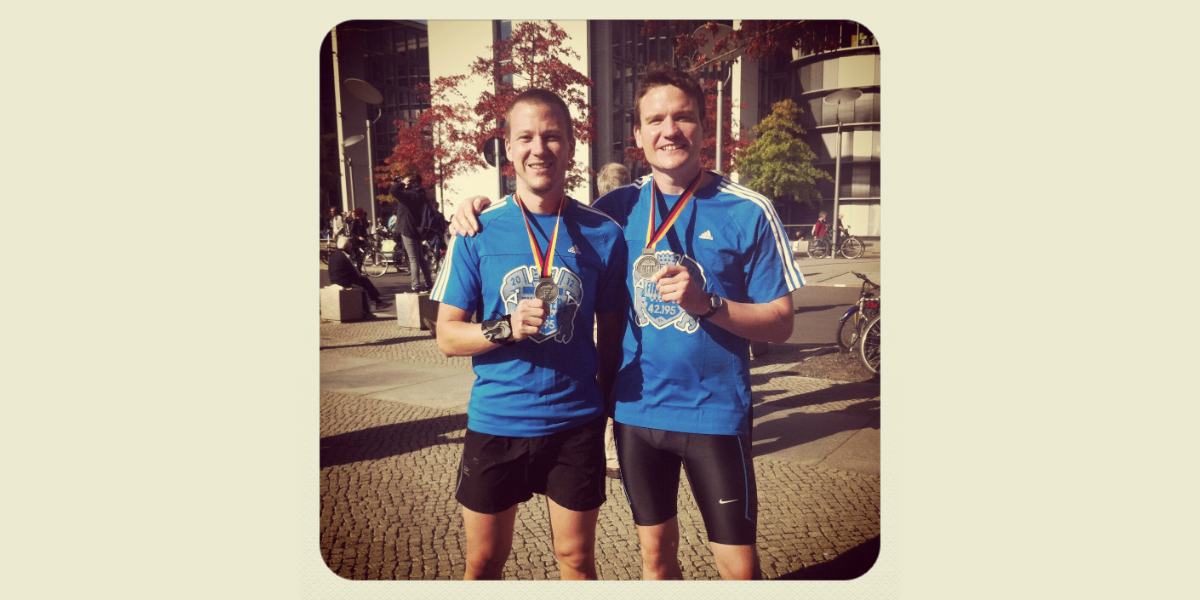
Arboreus is proud of its CEO, Gabor, who has just completed the first Marathon of his life in Berlin last weekend (see photo, he is on the left). As big a achievement as it is, it also got us thinking what EU career exam candidates have in common with Marathon runners: as it turns out, quite a lot!
So let's see a few things that come to mind:
Pick a big, juicy, audacious goal: by looking at the sheer number of EPSO exam applicants, you may get the same feeling of butterflies in your stomach that those considering to run continuously for 3-4 hours (at least!) and cover a distance that is longer than the entire highway ring around Brussels. But how else would you realize your dream if not by creating it first? Just because your ultimate objective seems challenging, it should not be a reason to demotivate you: on the contrary, it is a source of inspiration!
Plan way ahead in time: if you wake up tomorrow morning realizing your pre-selection tests are in two days, you need to be either a genius or extremely lucky to pass with a high mark. Similarly, marathon runners will not decide to join a competition one week before it is due to take place but they pick an event that is sufficiently ahead in time without any need to rush their preparation. Both the body and the mind must be gradually introduced to a massive workload, and adaptation (and learning) takes many weeks or months.
Prepare your preparation: though making mental calculations while doing your weekend shopping in the market can help develop your numerical reasoning skills, you don't prepare for the marathon by running after the bus each morning. Systematic, regular and well established workouts are needed, with varying levels of intensity. Creating a roadmap until D-Day is a great idea, and the same way marathon runners expose their body to different levels of training, you should do the same in your EPSO competition preparation: plan ahead to know when you are going to practice verbal reasoning, when will you try 'hard' level abstract reasoning tests, and don't just jump right into it.
Eliminate your weakest link: marathon runners, just like EU exam candidates, cannot afford any risk that may endanger the entire mission's success. If a runner's breathing technique is flawed, it can lead to failure by exhaustion at the 39th kilometer. If your greatest weakness is situational judgment tests and you may not reach the pass mark, this can lead to your forced exit from the competition. Identifying such risk elements is therefore crucial at the earliest possible stage, and even if you can't improve them to perfection, you can at least bring these up to an acceptable level.
When you are in it, just focus on the next step: as daunting as it may be when you start filling in the application form on EPSO's website, thinking how many others are doing the same and being terrified that you may overlook a compulsory checkbox or fill in a necessary box, just keep your eye on the immediate next step. Similarly, forget the Assessment Centre while you are still preparing for the pre-selection tests, and don't think of the numerical reasoning while you are sitting the verbal tests in the exam center. Marathon runners don't think of the full 42.195km when they have just completed the first 300 meters, their focus remains on going forward one more kilometer...and repeat this 42 times!
A training buddy can maximize your potential: preparing alone for a marathon is just as tough as learning Chinese from textbook: if may be possible, but why shoot yourself in the foot if you can find a like-minded, ambitious buddy with whom you can inspire each other when one of you is losing motivation, you can push each other to train harder, and you can simulate the exam environment to maximize your performance under pressure. Even at the final event, knowing you have a shoulder to lean on takes away much of the anxiety that many go-it-alone candidates have.
Don't "just" complete it, be among the top performers: marathon is extremely tough to complete in the first place, but even those who manage to do it are aiming for better results. Gabor did it in 4 hours (+ 38 seconds ;), but his next goal is to bring this below 3 hours 45 minutes. EPSO candidates are no different: passing all tests and getting a high score is laudable, but only top scores will grant you a placement high enough to qualify for the Assessment Center - and even there you need to demonstrate high levels of the 7+1 EPSO competencies to secure your place on the reserve list.
Failing is a great way to learn: if a marathon runner must give up the run due to whatever reasons, it is emotionally rather hard to accept. However, analyzing what went wrong is the first step to bringing awareness to your preparation methods and making sure next time you will prepare more and smarter too. EPSO exams are a tough nut to crack, and few people pass them on the very first try. Yet each trial will yield a great learning experience that you can leverage so you are much better prepared when the time of success is finally ready to meet you.
Once again, congrats to Gabor, you certainly inspired thousands of EPSO candidates (and to-be marathon runners) today!
(...and if you wish to start practicing for your EPSO exam today, here you can find lots of free tests)
Anything else we forgot to mention? Tell us in the comments below!